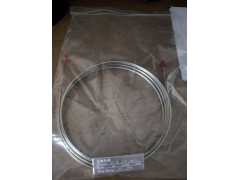
产品展示
您当前的位置:首页 » 产品展示 » 专用填充柱 » 脱氧柱

| 产品名称: | 脱氧柱 |
| 产品型号: | |
| 品牌: | 1941 |
| 产品数量: | |
| 产品单价: | 面议 |
| 日期: | 2023-06-28 |
脱氧柱的详细资料
脱氧柱脱氧柱 详细信息:
规格:3m*3mm,3m*1/8,3m*4mm
型号:401
应用:气体分离中微量O2的脱除
在工业氧的测定分析中,现使用国标GB/T 3863-1995《工业氧的测定分析法》中采用的是铜氨溶液吸收氧,根据吸收后残气体积,计算 氧的含量,但存在分析操作复杂、准确性差、不适合大空分装置液氧中氧气浓度测定等问题。
氧和氩的物理性质相近,在色谱柱上较难分离,得到的色谱峰通常是一混合组分,而无 法定量,因此氧氩分离成为色谱分离中一大的难题。在国标GB/T 14605-93《氧气中微量氩、 氮和氪的测定气相色谱法》中是采用脱氧柱(401脱氧剂)先将氧脱除,而后使被检测组分氩、 氮和氪经色谱柱分离后进入检测器,达到测定分析氩、氮等组分的
脱氧柱 图片:



401 deoxygenation column
401 deoxygenation column Detailed information:
Specifications: 3m*3mm, 3m*1/8, 3m*4mm
Model: 401
Application: Removal of trace O2 in gas separation
In the determination and analysis of industrial oxygen, the natio
Oxygen and argon have similar physical properties and are difficult to separate on the column. The obtained peak is usually a mixed compo
401 deoxygenation column
氧和氩的物理性质相近,在色谱柱上较难分离,得到的色谱峰通常是一混合组分,而无 法定量,因此氧氩分离成为色谱分离中一大的难题。在国标GB/T 14605-93《氧气中微量氩、 氮和氪的测定气相色谱法》中是采用脱氧柱(401脱氧剂)先将氧脱除,而后使被检测组分氩、 氮和氪经色谱柱分离后进入检测器,达到测定分析氩、氮等组分的
脱氧柱 图片:



401 deoxygenation column
401 deoxygenation column Detailed information:
Specifications: 3m*3mm, 3m*1/8, 3m*4mm
Model: 401
Application: Removal of trace O2 in gas separation
In the determination and analysis of industrial oxygen, the natio
Oxygen and argon have similar physical properties and are difficult to separate on the column. The obtained peak is usually a mixed compo
401 deoxygenation column